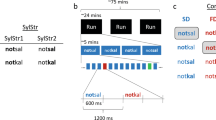Abstract
Immediate echolalia, a common language disorder in psychotic children, was studied in a series of replicated single-subject designs across six schizophrenic and five normal children. In Experiment 1, each child was presented with several questions and commands, some of which set the occasion for specific, appropriate responses and some of which did not. The former were referred to as discriminative stimuli and the latter, as neutral stimuli. The psychotic children tended to echo the neutral stimuli while responding appropriately to the discriminative stimuli; the normal children, in contrast, typically echoed neither type of stimulus. In Experiment 2, three psychotic children were taught appropriate responses to each of several neutral stimuli. Following this training, the children generally responded appropriately to these stimuli without echoing. A plausible interpretation of these results is that the neutral stimuli were initially incomprehensible or meaningless to the children (whereas the discriminative stimuli were comprehensible or meaningful) and that verbal incomprehensibility may be one important determinant of immediate echolalia. Finally, the results are noteworthy in that they isolate a sufficient treatment variable (i.e., the reinforcement of alternative, nonecholalic responses) for eliminating instances of this language anomaly.
Similar content being viewed by others
References
Carluccio, C., Sours, J. A., & Kalb, L. C. Psychodynamics of echo-reactions.Archives of General Psychiatry, 1964,10, 623–629.
Cunningham, M. A. A comparison of the language of psychotic and nonpsychotic children who are mentally retarded.Journal of Child Psychology and Psychiatry, 1968,9, 229–244.
Fay, W. H. Mitigated echolalia of children.Journal of Speech and Hearing Research, 1967,10, 305–310.
Fay, W. H. On the basis of autistic echolalia.Journal of Communication Disorders, 1969,2, 38–47.
Fay, W. H., & Butler, B. V. Echolalia, I.Q., and the developmental dichotomy of speech and language systems.Journal of Speech and Hearing Research, 1968,11, 365–371.
Griffith, R., & Ritvo, E. Echolalia: Concerning the dynamics of the syndrome.Journal of the American Academy of Child Psychiatry, 1961,6, 184–193.
Hartung, J. R. A review of procedures to increase verbal imitation skills and functional speech in autistic children.Journal of Speech and Hearing Disorders, 1970,35, 203–217.
Kanner, L.Child Psychiatry (2nd ed.). Springfield, Illinois: Charles C Thomas, 1948.
Lovaas, O. I., Koegel, R., Simmons, J. Q., & Long, J. S. Some generalization and follow-up measures on autistic children in behavior therapy.Journal of Applied Behavior Analysis, 1973,6, 131–166.
Matheny, A. Pathological echoic responses in a child: Effect of environmental mand and tact control.Journal of Experimental Child Psychology, 1968,6, 624–631.
Myklebust, H. R. Babbling and echolalia in language theory.Journal of Speech Disorders, 1957,22, 356–360.
Nakanishi, Y., & Owada, K. Echoic utterances of children between the ages of one and three years.Journal of Verbal Learning and Verbal Behavior, 1973,12, 658–665.
Piaget, J.Play, Dreams, and Imitation in Childhood. New York: Norton, 1962.
Risley, T., & Wolf, M. Establishing functional speech in echolalic children.Behavior Research and Therapy, 1967,5, 73–88.
Rutter, M. Concepts of autism: A review of research.Journal of Child Psychology and Psychiatry, 1968,9, 1–25.
Skinner, B. F.Verbal Behavior. New York: Appleton-Century-Crofts, 1957.
Van Riper, C.Speech Correction: Principles and Methods (3rd ed.). Englewood Cliffs, New Jersey. Prentice-Hall, 1963.
Wolff, S., & Chess, S. An analysis of the language of fourteen schizophrenic children.Journal of Child Psychology and Psychiatry, 1965,6, 29–41.
Author information
Authors and Affiliations
Additional information
This investigation was supported by USPHS Research Grant No. 11440 from the National Institute of Mental Health. The research was conducted while the first author held a post-doctoral fellowship from the Medical Research Council of Canada. The authors wish to express their appreciation for the help of William S. Miners, M.A., Program Director of Children's Services, Camarillo State Hospital, Camarillo, California. We also wish to thank Robert Koegel, Ph.D., and Janis Costello, Ph.D., for their many helpful comments and criticisms.
Rights and permissions
About this article
Cite this article
Carr, E.G., Schreibman, L. & Lovaas, O.I. Control of echolalic speech in psychotic children. J Abnorm Child Psychol 3, 331–351 (1975). https://doi.org/10.1007/BF00917420
Revised:
Issue Date:
DOI: https://doi.org/10.1007/BF00917420




